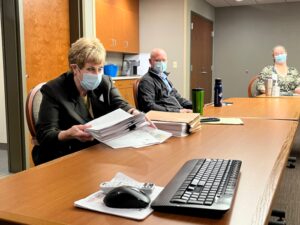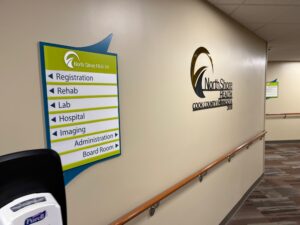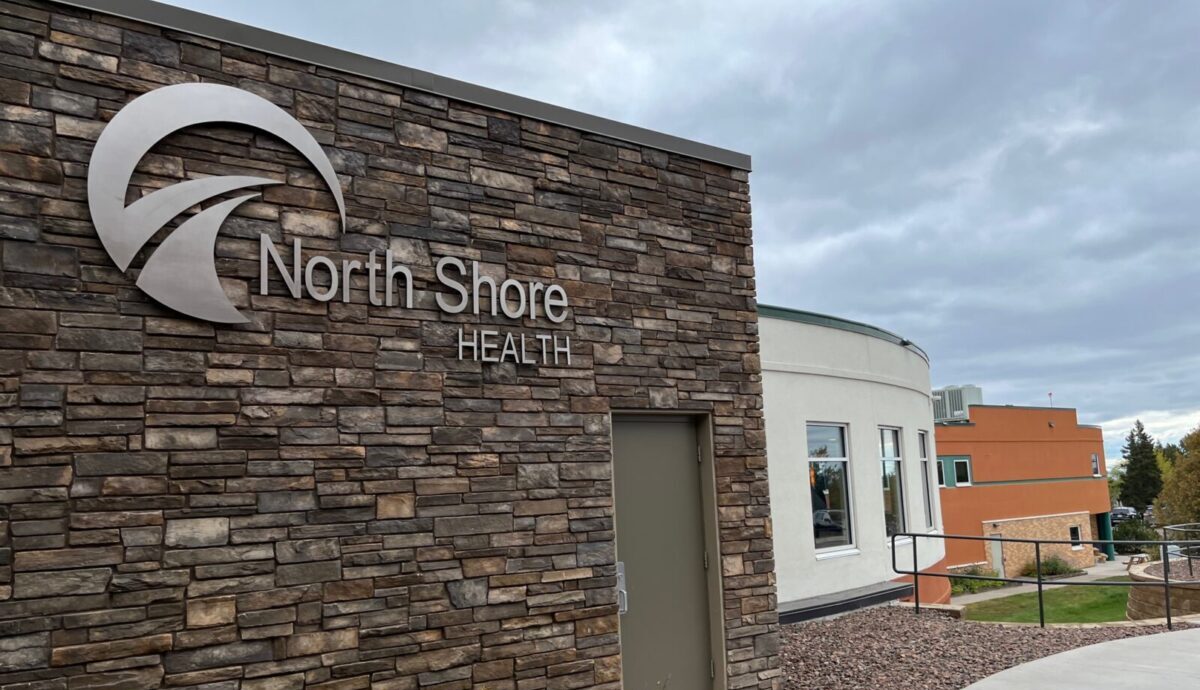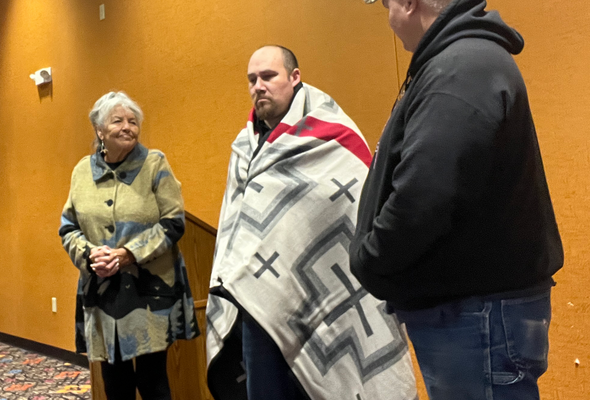WTIP investigates complexities of staffing shortage at North Shore Health
On a cool, sunny day in late September, North Shore Health Administrator Kimber Wraalstad walked into the board room at the local healthcare facility and set a bundle of documents on a table.
“This is what we’re dealing with,” Wraalstad said.
The documents included a recent policy directive handed down to rural healthcare facilities by the Centers for Disease Control and Prevention. The mandate will require healthcare workers at North Shore Health, and other similar facilities across the nation, to wear a mask, eye goggles and follow other safety procedures when dealing with wounds, intravenous injections, or catheter care.
The problem with the mandate, Wraalstad explained, is that it’s a new layer of administrative paperwork and another federal requirement that make working in healthcare challenging.
The question that prompted the local hospital administrator to retrieve the large bundle of papers from her office was rooted in why morale is reportedly low amongst the staff at North Shore Health, and what Wraalstad, as the leader of the organization, is doing to address the situation.

Sentiments of being underpaid and exhausted from navigating the COVID-19 pandemic are common themes inside the walls of many healthcare facilities at this time. These factors, and others, have people resigning from their jobs in healthcare at a staggering rate.
North Shore Health in Grand Marais is no exception.
On a broad scale, the reasons many in the healthcare field are leaving the industry at this time range from low wages to worker burnout associated with the pandemic.
However, at North Shore Health, there are other factors at play. The supplemental reasons for why there is a staffing shortage at North Shore Health, it seems, depend on who you ask.
WTIP spoke with 18 current and former staff from North Shore Health who say an ongoing issue rests solely at the feet of the administration. A lack of appreciation for hospital staff, a workplace culture that is not supportive of staff, and a general disconnect between the hospital administration and the other employees at North Shore Health were among the reasons people told WTIP they either quit working at the local healthcare facility, or were considering doing so. Though many of those interviewed for this story chose to keep their names anonymous, some spoke on the record. The individuals who remained anonymous said they were reluctant to go on record for fear of retribution.
Former Ambulance Director Steve DuChien, who retired in 2020, said the problem with the staffing shortage at North Shore Health is rooted in how the administration treats the staff.
“I believe the administration plays a part in that,” he said. “The lack of appreciation for employees, just how the employees just weren’t feeling they were being appreciated, and maybe not treated as well as they’d want to be.”
Of course, there is often more than one side to any such story. The WTIP News Department met Sept. 26 with top officials from North Shore Health, including Wraalstad, the director of nursing, the facility’s chief medical officer, the human resource director, and others, to discuss the current staffing shortage and complaints of low morale. The reasons cited by the leadership team at North Shore Health regarding the staffing shortage at the local healthcare facility focused on trends in the industry, a local housing crisis, and burdens placed on healthcare workers during the COVID-19 pandemic. And, indeed, there is data to back their claims. According to a June report from the American Hospital Association, the healthcare field has lost an estimated 20 percent of its workforce, including 30 percent of nurses. In Minnesota, job openings for nurses increased from 2,450 in 2019 to 5,587 in 2021, according to the Minnesota Department of Employment and Economic Development.
Anna Mowry is the director of workforce solutions at LeadingAge Minnesota, the largest association of organizations serving Minnesota seniors. Mowry presented information during a September conference in Brainerd that focused on the healthcare workforce staffing crisis in Minnesota. Wraalstad was in attendance at the conference representing North Shore Health. During a Sept. 28 interview with WTIP, Mowry said across the nation, nearly every provider is experiencing these staffing shortages.
“There’s some recent data from PHSI, a national organization that shows that across the United States, 99 percent of nursing homes and 96 percent of assisted living communities are facing these staffing shortages,” she said. “Communities are facing closure because of this across the U.S., as the demand and need for these services really is surging as our population ages.”
There are grumblings among some Cook County residents that all the beds at the Care Center at North Shore Health are not occupied. The reason, Wraalstad maintains, is due to the staffing shortage. If this is the case, such a scenario would be far from unique for North Shore Health. A LeadingAge Minnesota spokesperson said during a state senate hearing this spring that 78 percent of nursing homes in Minnesota and 35 percent of assisted living facilities statewide were limiting admissions.
During a Sept. 15 meeting, members of the North Shore Health board of directors spoke at length about concerns regarding continued staffing shortages at the local healthcare facility. Most recently, the hospital received a resignation from Troy Batchelor, director of nursing. This will be the third director of nursing to retire within the past five years.
During the meeting, board member Steve Nielsen asked Wraalstad, “Why do you think this is a regular thing?”
Wraalstad stated the reason for the revolving door position as, “It’s a challenging role to be a director of nursing.” She added, “It’s not one that is, I think, appropriately recognized as being the challenge that it is.”
The hospital is actively recruiting for a new director of nursing. Wraalstad said the position would have an interim director for a short period until the hospital finds a long-term replacement.
In a report shared this summer with the North Shore Health Board, Wraalstad said the ongoing staffing shortage at North Shore Health could lead to a disruption in certain operations for the Grand Marais-based healthcare facility, including the hospital’s ambulance service and the county’s only skilled-nursing facility for senior citizens.
“If (hiring) efforts are not successful, we may not be able to continue to provide services such as the ambulance and care center, as we are very dependent on people to allow us to provide these needed services,” Wraalstad said in a report shared with the North Shore Health Hospital Board during a meeting Aug. 18.
More recently, Wraalstad said the staffing shortage and high turnover rates are traceable to staff retirement, the stress of the pandemic, burnout, and continued mask and vaccine mandates for employees. “Healthcare is going through a staffing crisis that I don’t think has been seen before,” she said.
Wraalstad, recognized widely throughout the community for her dedication to her job as the hospital administrator, arrived to North Shore Health in 2010. Prior to arriving in Cook County, she worked as the CEO for 16 years at Presentation Medical Center in Rolla, North Dakota. During a 2011 interview, she said, “I believe healthcare is a calling,” while noting that she believes every employee from direct patient care to administration is important. “From an administrative standpoint, we still have an opportunity to make a difference in people’s lives,” she said. As the staffing crisis intensified this year at North Shore Health, Wraalstad was often working seven days a week. She assumed responsibilities that are outside the norm for a hospital administrator, including driving the ambulance and responding to medical emergencies in the community when there weren’t enough people to cover the shifts as a first responder.
 Wraalstad arrived at North Shore Health during a time of transition for the Grand Marais hospital. One major change was the administrative format for the healthcare facility that started in 2009 when the local hospital board made the decision to enter into an agreement with St. Luke’s Hospital in Duluth. The decision to enter into that agreement was preceded by the resignation of former Hospital Administrator Diane Pearson, who held the position for more than two decades.
Wraalstad arrived at North Shore Health during a time of transition for the Grand Marais hospital. One major change was the administrative format for the healthcare facility that started in 2009 when the local hospital board made the decision to enter into an agreement with St. Luke’s Hospital in Duluth. The decision to enter into that agreement was preceded by the resignation of former Hospital Administrator Diane Pearson, who held the position for more than two decades.
Several of the current and former employees of North Shore Health WTIP spoke with for this story said the change in administration was jarring to the culture of the workplace. Among them is Charlie Butter, the longtime maintenance technician at North Shore Health who retired in June 2018. Butter spent more than 18 years working at the local hospital, a tenure that includes an almost equal time working with Pearson and Wraalstad at the helm.
“Diane Pearson treated people with warmth and concern. She was professional, but also kind and genuine… that disappeared with the new administration,” he said. “Now, I believe people feel as though they are no more than disposable parts, and not truly valued members of a team.”
Many of the current and former employees that WTIP spoke with shared similar thoughts. They described the transition of the hospital’s administration as from a “culture of cooperation” to a “culture of fear.”
Batchelor, the outgoing director of nursing, told WTIP during the Sept. 26 roundtable discussion that comparing the management styles of Pearson and Wraalstad is unfair, and certainly dated.
“It’s been 12 years,” he said. “Can we move on?”
Batchelor, who has worked in healthcare facilities in multiple states and at facilities both large and small, said it’s not the job of a CEO to be “everyone’s buddy.” Their job, he added, is to make hard decisions and keep the organization financially stable.
Greg Ruberg is the president and CEO of Lakeview Hospital in nearby Two Harbors. Essentially, Ruberg has Wraalstad’s same job at the hospital in Two Harbors. Ruberg also works for St. Luke’s and oversees the management agreement with North Shore Health and the Duluth-based hospital. Ruberg said he does not know much about Wraalstad’s “day to day” work with the hospital and care center staff, but said her commitment to healthcare in Cook County is well-respected throughout the region.
“Kimber is very dedicated to North Shore Health and very dedicated to Cook County,” Ruberg said. “She works really hard to ensure that the organization is financially viable and it’s making good decisions for the future.”
For her part, Wraalstad said she is making attempts to address concerns from hospital staff when it comes to a workplace culture. Most recently, she started hosting monthly events called “Coffee with Kimber,” where employees can meet with her to discuss topics relevant to the job, including “things they’d like to see us improve on,” she said. In terms of wages, the hospital recently announced a temporary compensation adjustment for all employees. Starting in late August, North Shore Health agreed to provide a $3 per worked hour recognition payment for six months. The temporary compensation will end Feb. 25, 2023.
Nonetheless, staffing shortages remain abundant in healthcare facilities across Minnesota. A lack of housing options for new residents only compounds the problem, as it does for other organizations and businesses in the community, according to Michele Silence, the human resources director at North Shore Health.
“If you can bring 200 people here, then we might have a solution,” she said of the workforce shortage across the county.
Butter said the housing shortage is a reality, but that qualified healthcare workers are already living in the community and simply aren’t interested in working at North Shore Health.
“There’s most certainly a housing shortage for workers in Grand Marais,” he said. “But I believe that there are adequate numbers of qualified people who live in town already who would work there if they felt welcomed and appreciated. The migration of quality staff from the hospital to the clinic is certainly one good example of that.”
Difficulty between staff and the management team at North Shore Health is not a new phenomenon. Interestingly enough, DuChien, the former ambulance director, was the focus of a 2017 letter submitted from the ambulance crew at North Shore Health about his leadership style. The letter reads, in part: “Crew morale has suffered due to inconsistent, ineffective leadership. We have had members leave the ambulance service, and several others who have been seriously considering leaving, due to the very negative, disrespectful tone set by the ambulance director.”
WTIP asked DuChien for his thoughts about the fact he was voicing complaints and sharing what he is hearing about Wraalstad and the current management at the facility, when he was accused of many of the same things when he was a supervisor at North Shore Health.
“Yeah, that’s a pretty complex problem,” DuChien said. “If you’ve got one unhappy employee about me as a manager, for example. And instead of coming and talking to me, if a person wants to go and find another partner to agree with them, and then pretty soon, you’ve got a group of people agreeing that something is wrong.”
DuChien said that in his situation, something that could have been resolved internally “ended up exploding” into something that shouldn’t ever have happened, and that ultimately it comes down to healthy and effective communication.
“I think part of the problem they’re having up there now is not having good communication,” he said, “between the administrator, and other folks in the administration, and the employees.”
While DuChien was the focus of the complaints from the ambulance crew members in 2017, numerous former and current employees that WTIP spoke with said that the same issues of lack of support and poor management have continued underneath the new ambulance director Tom Fleming.
Mike Bartz started in 2019 at North Shore Health and left in late summer of 2020 to work at Lutsen Mountains as an EMT. Bartz remained in the healthcare industry and has housing in Cook County. However, he left due to the atmosphere and management in the ambulance department, he said.
While former employees who worked underneath the Pearson administration shared their perspective on the administrator transition, the same concerns regarding the current administration are shared by more recently hired staff.
Inadequate support and lack of compassionate leadership are two reasons why Adrianna Brisson, who worked in the medical records and billing office, said she left North Shore Health in 2020.
Brisson started at North Shore Health in 2015 and initially loved her job, she said. However, as time progressed and workloads and staffing issues increased, her enjoyment at work deteriorated, she added.
During the five years that Brisson worked at North Shore Health, there were 13 hires at the front desk, and three hires in payroll. She said she witnessed firsthand the constant turnover of healthcare staff.
Brisson acknowledged that healthcare rules and regulations change constantly, and the staff can struggle to stay on top of it. Nevertheless, to help the staff navigate the changes, she said a supportive leader is crucial.
As a show of support, the administration provided various leadership training. Wraalstad said the training was for leadership development and education.
“I can say that within those five years of all the leadership training, the people who really could have benefited from the most leadership training, and I don’t think took it to heart, was administration,” Brisson said.

In addition to leadership training, the administration conducted a culture survey in 2020 to assess staff morale in the hospital. Wraalstad said they had never done one before, and when asked why the hospital decided to conduct a survey, she said it was a “best practice.”
The COVID-19 pandemic hit the healthcare facility before the culture survey was finished, and it was never completed or used in any tangible way. Wraalstad said she would be open to conducting another culture survey in the near future.
During the Sept. 15 North Shore Health board meeting, multiple board members inquired about the culture in the hospital. Board member Steve Nielson asked Wraalstad, “What’s going on here culture-wise?”
One way to assess the culture in a healthcare facility is by looking at trends in exit interviews. Silence said that since she started in the HR department over a year ago, she hasn’t noticed any recurring themes or trends. She said previously, the exit interviews “weren’t shared with department leaders.” However, she is now compiling the information and providing department leaders with a brief summary. Wraalstad said she doesn’t read the exit interviews.
Brisson referenced former North Shore Health employees who now work at Sawtooth Mountain Clinic in Grand Marais as another example of the fact community members want to remain working in healthcare. She said the culture at Sawtooth Mountain Clinic is described as starkly different from North Shore Health. And the reason has to do with the leadership, they said.
“The general consensus from people that I talk to that work (at Sawtooth Mountain Clinic), they’re always just so happy and feel supported and cared about,” Brisson said.
While North Shore Health has hired new employees in recent years, the healthcare facility struggles with the retention of new staff, resulting in a continual long list of open positions. Currently, North Shore Health has 23 open positions, and Sawtooth Mountain Clinic has three.
Staffing shortages in the healthcare industry are dynamic and complex and while they certainly existed pre-COVID-19, the pandemic only amplified the situation. Meanwhile, concerns for quality and sustainable care for the citizens of Cook County were brought to the attention of the administration and the North Shore Health board in 2017 by the members of the Cook County Ambulance.
The letter said, “As demands for ambulance service in our community continue to rise, we come before you to ask for your help, so we can provide the quality patient care that the citizens of Cook County need and deserve.”
Five years later, the same issues remain, according to the numerous sources WTIP spoke with for this story. Bartz said this issue “is nothing new.”
Numerous former employees that WTIP spoke with, including Bartz, said they would go back to work at North Shore Health if changes were made in administration. Those sources all have housing in Cook County.
Moving forward, when it comes to finding ways to navigate a complex staffing shortage at North Shore Health in Grand Marais, the pieces need to all come together, Brisson said.
“Cook County needs to wake up and realize that we are in a very critical situation here,” she said. “And something needs to change or we will not have appropriate health care up here.”














